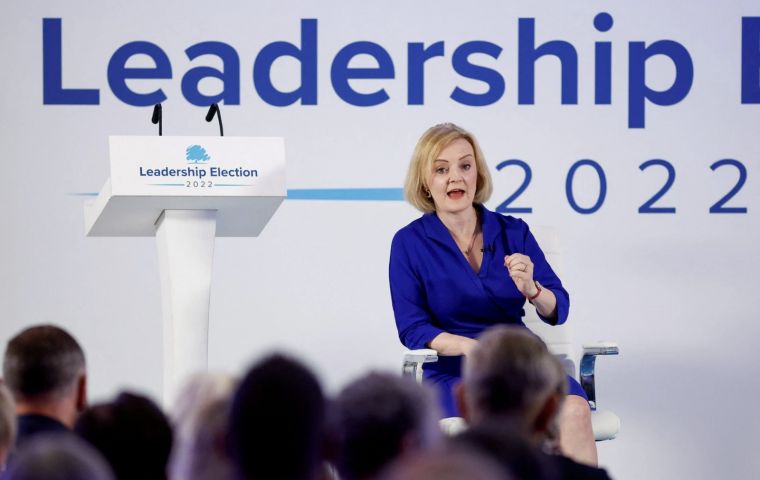MercoPress. South Atlantic News Agency
Liz Truss, if PM, looking at “nuclear” option of cutting VAT 5% across the board, media reports
 Ofgem hiked the price cap on household bills by 80%, meaning the typical household gas and electricity bill will rise to £3,549 a year from October
Ofgem hiked the price cap on household bills by 80%, meaning the typical household gas and electricity bill will rise to £3,549 a year from October Tory leader candidate and good chances of becoming the next British prime minister, Liz Truss would prioritize tax cuts over giving direct payments to every household to help cover the cost of rising energy bills. Reports suggest Ms Truss is considering cutting VAT across the board by 5%.
But her Tory leadership rival Rishi Sunak said the government “must provide some direct support” to all. All households are due to receive £400 off their energy bills this winter. This was part of a package of help announced by Mr. Sunak in May when he was still chancellor.
Last Friday, energy regulator Ofgem hiked the price cap on household bills by 80%, meaning the typical household gas and electricity bill will rise to £3,549 a year from October.
Both candidates to succeed Boris Johnson have faced repeated questions about what action they would take.
Ms Truss has so far only confirmed she will cut National Insurance and green levies on bills.
On Sunday night, a member of Ms Truss's campaign team said: “Liz has been clear we need to lower the burden of taxation and focus on boosting energy supplies and this will be her priority as prime minister.
”She's also been clear further support may be required to help. Her preference is to target this to those most in need, but isn't ruling anything out.“
A report from the Sunday Telegraph said Ms Truss was looking at a ”nuclear“ option to cut VAT by 5%, saying it could save the average household £1,300 a year.
Mr Sunak's team has dismissed a cut to all VAT as being ”incredibly regressive“, saying it would cost more than £30bn.
A source on his campaign team added: ”Tory members will not like the sound of Liz Truss boosting welfare - once it goes up, it's hard to take back down.
“It also means the worst off this winter are hardworking families and pensioners on middle incomes, which are Conservative and swing voters. Truss's plan is a gift to Labour.”
The former chancellor has said he will cut VAT on energy bills and - writing in the Times on Saturday - said direct government support must be provided to everyone, with a focus on low-income households and pensioners.
He has also indicated that, for the most vulnerable household, he would try to make up the difference between the current energy price cap of £1,971 a year and the new cap of £3,549 by changing things like welfare benefits and pensioners' winter fuel credits.
Prime Minister Boris Johnson writing in the Mail on Sunday said his successor would deliver a “huge package” of support, without saying what that would be.
He said the months ahead were going to be “tough, perhaps very tough” and energy bills would be “eye-watering”.
In his last week as prime minister, Mr Johnson is expected to give a speech about the future of energy that is likely to serve as a challenge to his successor not to neglect plans to ramp up other energy sources, like offshore wind and nuclear power.
All households will get the £400 rebate on energy bills, with low income and vulnerable households receiving an additional £650.
Pensioners will also receive £300 along with their winter fuel payment in November, and people on an eligible disability benefit will receive an additional £150.




Top Comments
Disclaimer & comment rulesCommenting for this story is now closed.
If you have a Facebook account, become a fan and comment on our Facebook Page!